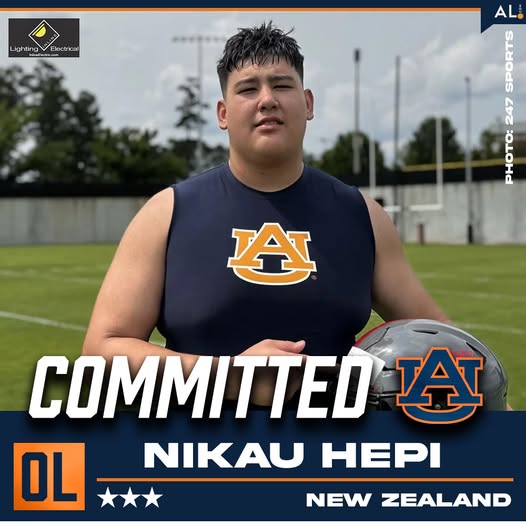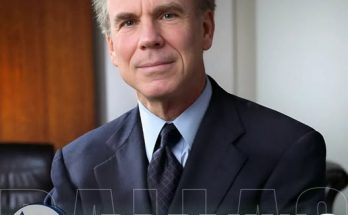Nikau Hepi has just altered the trajectory of international football recruiting in a single, groundbreaking decision. The 6-foot-7, 305-pound offensive lineman from New Zealand made history by becoming the first player from the NFL Academy’s Asia-Pacific campus to commit to a U.S. college program, pledging his future to Auburn University. It’s a moment that resonates far beyond Auburn’s Jordan-Hare Stadium or even the Southeastern Conference—it signals a shift in the global reach of American football and opens the floodgates for future international prospects to follow suit.
For Hepi, this commitment to Auburn is more than just a collegiate choice—it’s the culmination of a dream forged thousands of miles from the traditional American football hotbeds of Texas, Florida, or Georgia. Hailing from the rugby-rich culture of New Zealand, Hepi found himself gravitating toward a different kind of contact sport, one where size, footwork, and grit meet strategy, technique, and explosive athleticism. The NFL Academy’s expansion to the Asia-Pacific region provided the perfect platform for a prospect like Hepi to showcase his potential in a structured environment that bridges the gap between local promise and international opportunity.
Auburn’s coaching staff, led by head coach Hugh Freeze, has long sought to make waves on the recruiting trail, but securing a commitment from a player like Hepi reflects a broader vision. It’s not just about dominating SEC recruiting battles anymore—it’s about establishing a global pipeline. Freeze and his staff recognized the unique physical tools and raw talent Hepi possesses: a rare blend of size, length, and athleticism in a player who is still developing but already displaying traits seen in high-level linemen.
Though Hepi is rated as a three-star prospect in the 2026 class, those familiar with international recruiting understand that rankings rarely tell the full story. Evaluators have only recently begun expanding their scouting presence to programs like the NFL Academy’s Asia-Pacific division, and the star rating often lags behind the player’s actual ability. Watching Hepi’s film reveals a physically dominant lineman with quick feet, aggressive hand placement, and a strong understanding of leverage—traits that SEC programs covet. What’s more, his coachability and maturity are often lauded by those who have worked with him directly.
At Auburn, Hepi will step into one of the most intense and competitive environments in college football. The Tigers are always in the spotlight, whether contending for SEC titles or battling arch-rival Alabama in the Iron Bowl. But for a player like Hepi, that pressure represents opportunity. It’s a stage to prove himself against the very best. It’s also an ideal developmental environment, with top-tier strength programs, elite position coaches, and a fanbase hungry to embrace newcomers who show grit and pride in wearing the orange and blue.
The significance of this commitment is monumental for the NFL Academy as well. Founded to provide elite international prospects with the training, education, and exposure necessary to pursue college football careers in the U.S., the NFL Academy has largely been centered in the UK. The addition of an Asia-Pacific campus was a bold move aimed at capturing untapped talent from Australia, New Zealand, Polynesia, and the wider Pacific Rim. Now, with Hepi’s commitment, that gamble has paid off. It sends a message to aspiring athletes across the region: the path to American college football is no longer theoretical—it’s real, and it starts now.
This commitment also places Hepi in the growing lineage of New Zealanders making their mark in American football. While rugby has long been the national sport, the success of athletes like Jordan Mailata—who transitioned from rugby to become a starting offensive tackle for the Philadelphia Eagles—has begun to turn heads. Hepi, inspired by such stories, chose football early and embraced the challenge of learning an entirely different sport. His development has been rapid and impressive, and now, he stands as a beacon for other Kiwi athletes contemplating a similar leap.
Auburn’s fanbase has already responded with enthusiasm. Social media lit up following Hepi’s announcement, with Tigers supporters celebrating both the acquisition of a massive body for the trenches and the groundbreaking nature of the signing. Auburn has always prided itself on embracing diversity, whether through its coaching hires, its recruitment, or its broader campus culture. Hepi’s arrival adds a new chapter to that story—one written in international ink.
Recruiting insiders have noted that Auburn beat out several other major programs for Hepi’s commitment. Though schools like Oregon, Michigan, and USC had begun to show interest, Hepi felt an early connection with Auburn’s staff, culture, and developmental plan. The Tigers’ emphasis on building from the line of scrimmage resonated with him. Add to that the program’s history of producing top-tier offensive linemen, and it’s clear why Auburn emerged as the frontrunner.
The road ahead will not be without challenges. Transitioning from international football development to the SEC is a leap, even for the most talented athletes. The game is faster, more physical, and more complex. But those close to Hepi say he thrives on adversity. He’s already undergone a dramatic cultural shift by immersing himself in American football while based in New Zealand. Adapting to life in Auburn, Alabama, will be just another chapter in a journey already defined by bold moves and big dreams.
Hepi’s decision could trigger a domino effect. College programs have watched the NFL Academy’s European output with increasing interest, but some hesitated to invest serious recruiting energy in the Asia-Pacific branch. That’s no longer an option. Auburn’s move—bold, calculated, and forward-thinking—may force the hand of other Power Five programs. In the hyper-competitive world of recruiting, no edge can be ignored, and Hepi’s commitment will now make every coach ask the same question: “Who else is out there?”
For Auburn, the implications go beyond the field. This is a brand-building moment—proof that the Tigers are not just players in the national scene but emerging influencers in the international game. For a program that has long battled against the shadow of Alabama and Georgia, seizing new territory—both geographically and symbolically—is invaluable. Hepi, with his compelling story and enormous upside, becomes a central figure in this new chapter.
And for the NFL Academy Asia-Pacific campus, the door is now open. Coaches, players, and administrators can point to Hepi as proof of concept. The blueprint has been written: train hard, embrace the process, and if you’re good enough, American dreams are within reach.
Nikau Hepi didn’t just commit to a college program—he committed to making history. And in doing so, he may have altered the future of international football recruiting forever.



